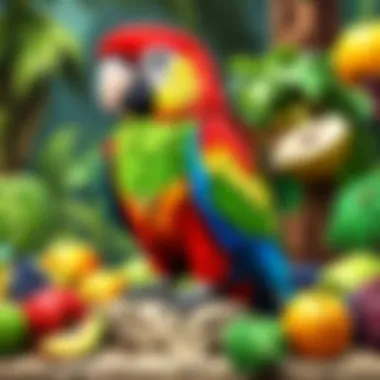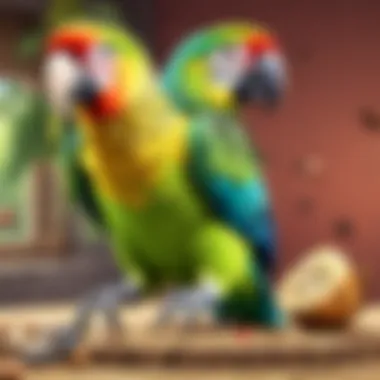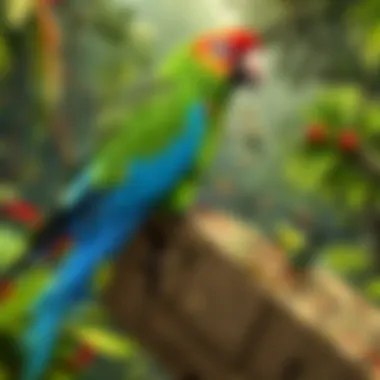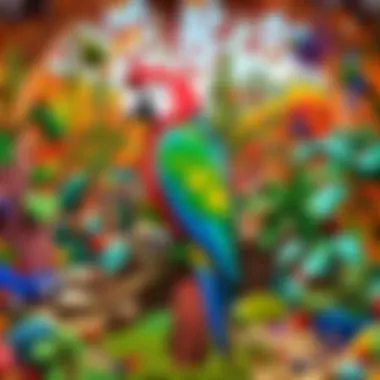Unveiling the Culinary Preferences of Parrots: A Deeper Look into What Parrots Eat


Minecraft Game Guides
Parrots, fascinating creatures of the avian world, possess intriguing dietary habits that play a vital role in their overall health and well-being. As we embark on this culinary exploration, we will delve deep into the diverse range of foods that form the nutritional foundation of these magnificent birds. From an assortment of seeds and fruits to enriched nuts and occasional insects, understanding the dietary preferences of parrots is essential for their sustenance.
Character Creation Guide
Understanding the dietary habits of parrots involves a meticulous journey into their natural habitats and behaviors. These colorful birds showcase a preference for a varied diet, rich in essential nutrients and vitamins. By mimicking their natural food sources, we can ensure that our feathered friends receive a well-balanced diet that mirrors their nutritional requirements.
Building Techniques Tutorial
Building a nutritional plan for parrots involves incorporating a diverse array of food options, ranging from seeds and pellets to fresh fruits and vegetables. Balancing these elements is crucial to optimize their health and ensure they receive a spectrum of nutrients. Adopting sustainable feeding practices is key to supporting their dietary needs.
Redstone Mechanics Explained
The nutritional requirements of parrots evolve throughout their lifespan, necessitating adaptability in their diet. For example, younger parrots may have different dietary needs compared to older ones. Recognizing these nuances and adjusting their food intake accordingly is essential for their growth and development.
Latest Updates and Patch Notes
Patch Note Breakdown
Keeping abreast of the latest research and developments in avian nutrition is imperative for providing optimal care to parrots. Research studies and dietary recommendations regularly undergo updates based on new findings, requiring bird owners to stay informed and update their feeding practices accordingly.
New Features Analysis
Innovations in pet food industry drive the introduction of new dietary options for parrots. From specially formulated pellets to enriched seed mixes, these advancements offer diverse choices for bird owners looking to enhance their pet's nutritional intake. Evaluating the efficacy of these new features is essential for determining their impact on parrot health.
Biome and World Generation Updates
The dietary preferences of parrots may vary based on their species and natural habitat. For instance, wild parrots may consume a diet primarily consisting of fruits and seeds, whereas pet parrots might be more accustomed to commercial bird feed. Understanding these nuances is crucial for tailoring the diet to meet each bird's individual requirements.
Mod Reviews and Recommendations
Top Mods of the Month
Exploring innovative dietary supplements and enhancements can offer valuable insights into optimizing the health and well-being of parrots. From vitamin-enriched treats to foraging toys that stimulate natural feeding behaviors, incorporating these mods into their diet regimen can provide mental and physical enrichment.
Mod Spotlight Series
Highlighting dietary modifications and enhancements through a mod spotlight series can inspire bird owners to try new feeding strategies with their parrots. These spotlight features showcase creative ways to diversify a parrot's diet and introduce novel food experiences that promote engagement and activity.
Mod Installation Guides
Implementing dietary modifications through accessible installation guides simplifies the process for bird owners seeking to enhance their parrot's nutritional intake. These step-by-step instructions can empower caretakers to make informed choices about their bird's diet and incorporate beneficial dietary changes seamlessly.
Minecraft News and Developments


Industry News and Trends
The evolving landscape of avian nutrition unveils emerging trends and practices that shape the dietary habits of parrots. By staying informed about industry news and trends, bird owners can adapt their feeding approaches to align with the latest advancements in avian health and nutrition.
Behind-the-Scenes of Updates
Navigating the intricacies of dietary updates and nutritional guidelines requires insight into the ongoing research and developments in avian nutrition. Understanding the methodologies behind these updates enables a deeper comprehension of the rationale driving dietary recommendations for parrots.
Upcoming Features and Sneak Peeks
Anticipating forthcoming advancements in avian nutrition provides bird owners with a preview of the dietary innovations that may soon be available for parrots. By staying abreast of these sneak peeks, caretakers can prepare to incorporate new features and enhancements into their parrot's feeding regimen.
Introduction
In the realm of avian dietary habits, the specific dietary requirements of parrots stand out due to their diversity and importance towards the overall well-being of these exotic birds. As we embark on this culinary exploration of parrot diets, we delve into a world where seeds, fruits, nuts, and even insects play vital roles in meeting their nutritional needs. By understanding what constitutes a healthy diet for parrots, we are better equipped to ensure their longevity and vitality with targeted nutrition.
Understanding Parrot Diets
Parrot diets encompass a wide array of food types that cater to their unique physiological and metabolic needs. From the essential carbohydrates found in seeds to the vitamins and minerals abundant in fruits and vegetables, each component serves a specific purpose in sustaining the health of these magnificent birds. By grasping the intricacies of parrot diets, we gain insights into the intricate balance required to support their energy levels, plumage quality, and overall health.
Importance of Proper Nutrition
Proper nutrition is the cornerstone of parrot care, influencing every aspect of their physical health and vitality. By providing a well-rounded diet rich in essential nutrients, caregivers can safeguard against common ailments and deficiencies that may arise from inadequacies in their food intake. Understanding the significance of proper nutrition not only promotes longevity but also enhances the quality of life for parrots, ensuring they thrive in captivity with vibrant feathers and a strong immune system.
Seeds and Grains
In the context of exploring the dietary habits of parrots, Seeds and Grains play a pivotal role in providing essential nutrients for these magnificent avian creatures. Parrots have a diverse palate, and including seeds and grains in their diet offers a variety of health benefits. These food items are rich in vitamins, minerals, and fiber that support the overall well-being of parrots. However, it is crucial to ensure a balanced intake of seeds and grains to meet the specific nutritional requirements of each parrot species.
Varieties of Seeds Consumed
Sunflower Seeds
Sunflower Seeds are a popular choice among parrots due to their rich nutritional content. These seeds are packed with essential nutrients like Vitamin E, which provides antioxidant benefits. Parrots enjoy the texture and taste of sunflower seeds, making them a favorite treat. However, it is important to offer sunflower seeds in moderation as they are high in fat content.
Safflower Seeds
Safflower Seeds are another common seed variety consumed by parrots. These seeds are renowned for their high protein and fiber content, supporting digestion and muscle development in parrots. The unique feature of safflower seeds lies in their versatility, as they can be offered as a standalone treat or mixed with other bird foods. However, some parrots may find safflower seeds less appealing compared to sunflower seeds, so it's essential to observe individual preferences.
Millet
Millet is a nutritious seed option for parrots, providing a good source of carbohydrates and B vitamins. Parrots benefit from the energy boost that millet offers, especially during active periods. The small size of millet seeds makes them easy for parrots to handle and consume. However, excessive consumption of millet may lead to weight gain in some parrot species, so it's necessary to regulate the portions offered.
Nutritional Benefits of Seeds
Exploring the nutritional benefits of seeds for parrots reveals a spectrum of advantages. Seeds are rich in healthy fats, protein, and essential nutrients that support parrots' energy levels and overall health. By incorporating a variety of seeds into their diet, parrots can access a diverse range of vitamins and minerals crucial for their metabolic functions. However, it's essential to balance seed consumption with other food groups to ensure a well-rounded diet for parrots.


Fruits and Vegetables
In the realm of parrot nutrition, the inclusion of fruits and vegetables plays a pivotal role in ensuring a well-rounded diet for these avian beings. Fruits and vegetables offer a plethora of essential vitamins, minerals, and antioxidants that contribute to overall health and vitality. Parrots derive various nutrients from fruits like apples, grapes, and bananas, along with vegetables that provide fiber and additional micronutrients.
Favorite Fruits Among Parrots
- Apples:
Apples:
Apples stand out as a favored fruit among parrots due to their crunchy texture and slightly sweet flavor. These fruits are rich in vitamin C, promoting a robust immune system in parrots. The high fiber content in apples aids in digestion and supports gastrointestinal health. However, it's important to remove the seeds as they contain cyanide compounds that can be harmful to parrots.
- Grapes:
Grapes:
Grapes are a popular choice among parrots for their juiciness and natural sweetness. They offer hydration and a dose of natural sugars for quick energy. The presence of antioxidants in grapes benefits cellular health and may reduce inflammation. Nonetheless, grapes should be offered in moderation to prevent excess sugar consumption.
- Bananas:
Bananas:
Bananas are prized by parrots for their creamy consistency and potassium content, which is essential for muscle function and electrolyte balance. The B vitamins in bananas support metabolism and overall energy levels. While bananas are nutritious, they are also high in natural sugars, so portion control is crucial to prevent obesity and related health issues.
Benefits of Including Vegetables
The incorporation of vegetables into a parrot's diet provides a spectrum of vital nutrients like vitamin A, vitamin K, and folate, promoting optimal health and well-being. Vegetables such as leafy greens, carrots, and bell peppers offer vital antioxidants and phytonutrients that support immune function and assist in combating oxidative stress. Including a variety of vegetables ensures a broad range of nutrients that contribute to the overall nutritional balance crucial for parrot health.
Nuts and Legumes
In the context of exploring the dietary habits of parrots, the section on nuts and legumes plays a crucial role in understanding the nutritional requirements of these avian creatures. Nuts and legumes are rich sources of essential nutrients that contribute to the overall health and well-being of parrots. Including a variety of nuts and legumes in their diet ensures a balanced intake of protein, healthy fats, vitamins, and minerals necessary for their optimal growth and development. When considering the dietary needs of parrots, the significance of nuts and legumes cannot be overlooked.
Popular Nut Choices
- Almonds: Among the popular nut choices for parrots, almonds stand out for their unique nutritional profile. Almonds are highly regarded for their high protein content, essential fats, and vitamin E, making them a valuable addition to a parrot's diet. The crunchy texture and rich flavor of almonds make them a delightful treat for parrots, encouraging healthy eating habits. However, it's essential to feed almonds in moderation due to their high-fat content, ensuring they complement a well-balanced diet for parrots.
- Pecans: Pecans offer a distinctive flavor and texture that can entice parrots with their rich, buttery taste. Rich in antioxidants, vitamins, and minerals, pecans provide essential nutrients that support the overall health of parrots. Incorporating pecans into a parrot's diet can add interest and variety, promoting dietary diversity. Despite their nutritional benefits, it's advisable to feed pecans in limited quantities to prevent overconsumption and maintain a healthy nutritional balance for parrots.
- Walnuts: Known for their brain-boosting properties, walnuts are a popular choice for enhancing cognitive function in parrots. Walnuts are packed with omega-3 fatty acids, antioxidants, and minerals that promote heart health and strengthen immune systems. The crunchy texture of walnuts can stimulate a parrot's natural foraging behavior, providing mental and physical enrichment. While walnuts offer numerous health benefits, they should be given sparingly due to their calorie-dense nature, ensuring they complement other dietary components in a well-rounded nutrition plan.
Health Benefits of Legumes
Exploring the health benefits of legumes reveals their importance in providing parrots with a diverse array of nutrients essential for their vitality. Legumes, such as lentils, chickpeas, and beans, offer a plant-based protein source that supports muscle development and metabolic functions in parrots. The fiber content in legumes aids in digestion and promotes gut health, reducing the risk of digestive issues in parrots. Additionally, legumes are rich in vitamins, minerals, and antioxidants that boost immunity and overall well-being. Including legumes in a parrot's diet contributes to a balanced nutritional intake and offers a flavorful alternative to traditional seed-based diets. Overall, legumes play a vital role in enhancing the dietary diversity and ensuring the holistic health of parrots.
Protein Sources
In the exhaustive exploration of the dietary habits of parrots, the section on Protein Sources emerges as a crucial component. Proteins play a pivotal role in the overall health and well-being of these avian creatures, serving as the building blocks for critical bodily functions. Parrots require an adequate protein intake to maintain muscle integrity, support immune function, and ensure proper growth and development. Incorporating protein from diverse sources is essential to meet the varying nutritional needs of different parrot species.
When delving into specific protein sources for parrots, it is imperative to consider the quality and digestibility of the proteins provided. Insects and bugs are a prime source of protein for many parrot species, offering a nutrient-dense option that mirrors their natural diet in the wild. The consumption of insects not only caters to their biological requirements but also stimulates their foraging instincts, enriching their overall eating experience.


Insects and Bugs
The consumption of insects and bugs forms a vital part of the natural diet of several parrot species. In the wild, parrots often feed on insects as a primary protein source, obtaining essential nutrients like amino acids that are crucial for their health. For pet parrots, incorporating insects and bugs into their dietary regimen can help replicate this natural feeding behavior, promoting both physical and mental stimulation.
When selecting insects and bugs for parrots, it is crucial to ensure they are free from pesticides and other harmful substances. Common options include mealworms, crickets, and ants, which are rich in protein and offer a diverse nutritional profile. By introducing insects into their diet, parrot owners can enhance the overall nutritional content of their feathered companions' meals, fostering optimal health and vitality.
Lean Meats
While insects and bugs offer a natural and nutritious protein source for parrots, lean meats present an alternative option for fulfilling their protein requirements. Lean meats such as skinless poultry or cooked lean beef can provide a concentrated source of high-quality protein, aiding in muscle maintenance and growth. However, it is essential to moderate the intake of lean meats and ensure they are cooked thoroughly to avoid any potential health risks.
Incorporating lean meats into the diet of parrots can offer a complementary source of protein alongside other traditional options. By diversifying the protein sources available to parrots, owners can ensure a balanced and nutritionally rich diet that caters to their feathered friends' specific needs. With proper consideration and moderation, lean meats can contribute to the overall health and vitality of pet parrots, supporting their physical well-being and natural dietary preferences.
Supplements and Treats
When it comes to the dietary habits of parrots, the section on Supplements and Treats carries significant importance in enhancing their overall health and well-being. Parrots, like humans, require a diverse range of nutrients to thrive, and supplements play a crucial role in fulfilling any gaps that may exist in their diet. Calcium supplements, for instance, are vital for maintaining strong bones and eggshell formation in breeding females. Ensuring the right balance of supplements is key to preventing deficiencies and maintaining optimal health for parrots.
Calcium Supplements
Calcium is an essential mineral for parrots, especially for birds that are in the breeding stage or those at risk of calcium deficiencies. Providing calcium supplements helps in preventing issues like egg binding and weak eggshells in breeding females. It is essential to consult with an avian vet to determine the correct dosage and supplement form suitable for your parrot's specific needs. Calcium supplements should be integrated into the bird's diet strategically, ensuring they receive adequate amounts without overdosing.
Treats for Enrichment
In addition to supplements, treats play a significant role in enriching the lives of parrots. Treats provide mental stimulation, encourage foraging behavior, and serve as rewards during training sessions. However, it is crucial to select treats that are nutritious and safe for parrots. Fresh fruits like apples or bananas, and vegetables can be excellent options for treats. Furthermore, offering a variety of treats can prevent dietary monotony and contribute to the overall well-being of parrots. Keep in mind that treats should only compose a small portion of the bird's daily diet to ensure they receive essential nutrients from their primary food sources.
The Role of Water
In the comprehensive exploration of parrots' dietary habits, one crucial element that cannot be overlooked is the role of water. Water plays a vital role in maintaining the overall health and well-being of these magnificent avian creatures. Ensuring that parrots have access to an an abundant and clean water source is paramount for their survival.
Water serves multiple essential functions for parrots. Firstly, it aids in digestion, enabling the breakdown of food particles and absorption of nutrients. Proper hydration is necessary for the smooth functioning of their digestive system, ensuring that they can extract maximum nutrition from their diet. Additionally, water plays a key role in regulating body temperature. As parrots do not have sweat glands, they rely on evaporative cooling to maintain their body temperature, making access to water crucial, particularly in hot climates.
Furthermore, hydration is essential for the transportation of nutrients throughout the body. Water acts as a medium for essential nutrients to move through the bloodstream and reach various organs, promoting overall health and vitality. Dehydration can lead to serious health issues for parrots, affecting their organ function and overall well-being.
Hydration Needs of Parrots
Understanding the hydration needs of parrots is vital for ensuring their optimal health. Parrots have varying water intake requirements based on factors such as their size, activity levels, and environmental conditions. On average, a parrot should consume about 10% of its body weight in water daily to maintain proper hydration.
Factors like diet composition can also impact a parrot's hydration needs. Diets rich in dry seeds may necessitate increased water consumption to aid in digestion. Monitoring your parrot's water intake and ensuring access to fresh water at all times is crucial in meeting their hydration needs.
In addition to their daily drinking water, parrots may obtain moisture from certain fruits and vegetables, further contributing to their overall hydration. Understanding and fulfilling their hydration requirements play a significant role in supporting their health and well-being.
Importance of Clean Fresh Water
The importance of offering parrots clean, fresh water cannot be overstated. Contaminated or stagnant water sources can harbor harmful bacteria, leading to health issues for your feathered companions. Regularly cleaning and refilling their water receptacles is imperative in preventing the growth of bacteria and ensuring water quality.
Parrots are sensitive creatures, and water quality directly impacts their overall health. Chlorinated or chemically treated water can be detrimental to their well-being, so opting for filtered or purified water is advisable. Furthermore, stagnant water can attract mosquitoes and other pests, posing additional health risks.
To promote proper hydration and overall health, providing parrots with ample clean, fresh water daily is essential. Monitoring water consumption, maintaining cleanliness, and ensuring water quality are key considerations in meeting the hydration needs of your beloved avian companions.
Conclusion
In caps Avec Extraplatform. Here's the final section on what parrots like to eat: a vital aspect to ensure their thriving health. Understanding the diverse dietary requirements of these avian creatures is paramount--not just for survival but for optimal well-being as well. By comprehending and catering to their nutritional needs like seeds, fruits, nuts, insects, or even supplements, parrots can maintain their vibrant feathers, energetic behavior, and overall health. Just as in the real world, the digital realm of Minecraft mimics the importance of balance and variety, highlighting the significance of a well-rounded diet for parrots to flourish in their in-game habitats. By offering a comprehensive overview of parrots' dietary preferences in Minecraft, players can implement realistic feeding patterns to keep their virtual pets healthy and dynamic. Emphasizing the provision of fresh water, a key element often overlooked, parallels the players' responsibility to maintain their in-game parrots' hydration levels for top-tier performances within the intricate Minecraft gameplay. This holistic approach, tailoring the article towards Minecraft enthusiasts, weaves expert guidance nested with detailed specifics to elevate the gaming experience one parrot nibble at a time.



